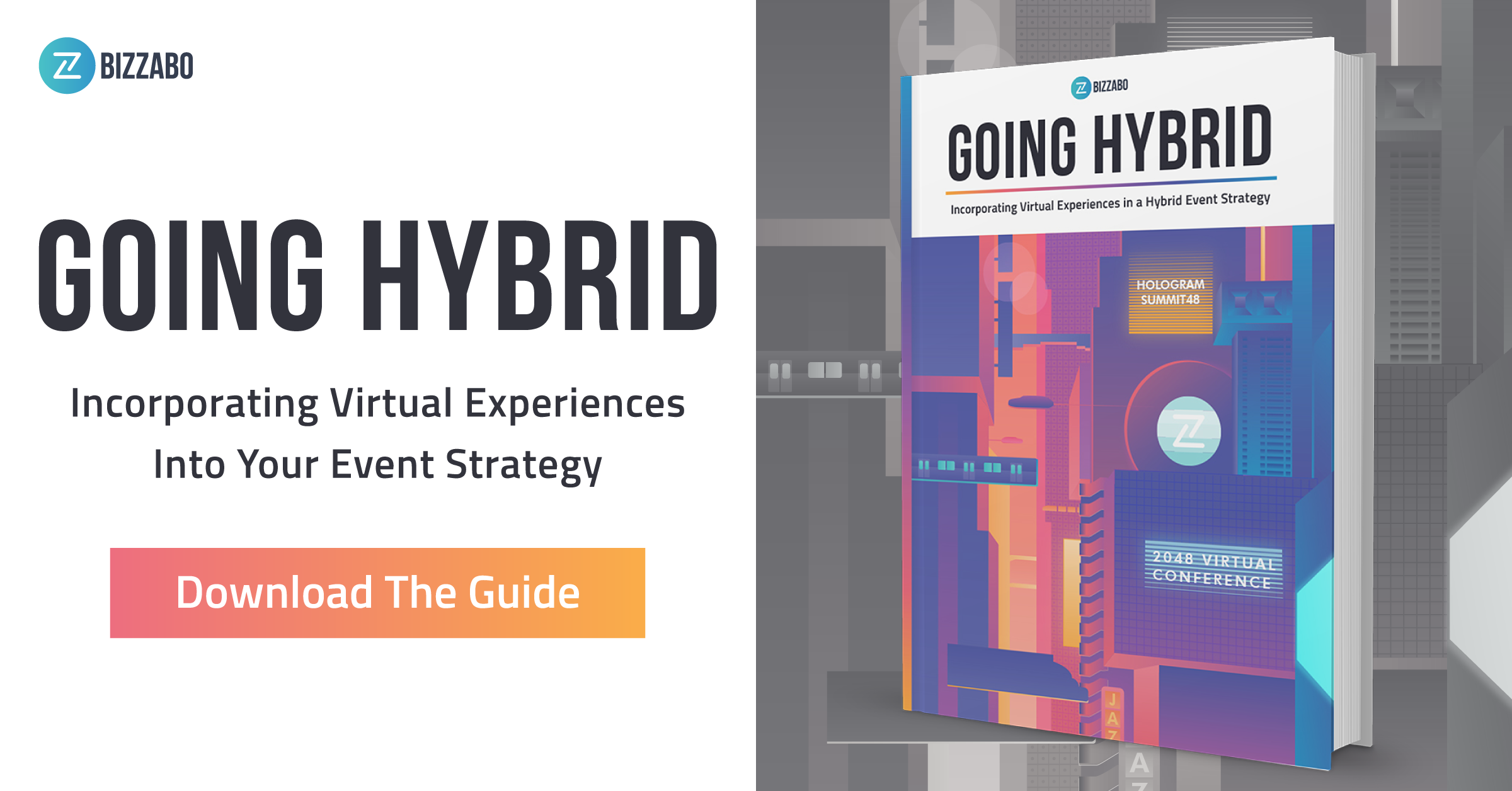These are the key elements to consider when evaluating virtual event platforms so you can find the right solution for your virtual event.
The COVID-19 pandemic disrupted the entire events industry and sparked a monumental shift from in-person events to virtual conferences. In the beginning of the pandemic, event planners were looking for a quick and easy solution to help them pivot their live events to virtual events. The world took notice as events across the globe were postponed, canceled, or moved to a virtual platform. There was no room nor need for bells and whistles, just the bare necessities and quickest execution. Production value and attendee experience were the last thing on anyone’s mind, planners were simply satisfied with the ability to connect to their audiences virtually.
As zoom fatigue sets in and virtual events become commonplace, the standard has changed. In order to continue delivering unique attendee experiences and creating value, the events industry must be agile. Event planners know finding a virtual event platform that can be a long-term solution is not just a priority, but a necessity. But with hundreds of platforms available, how can you determine which tool best suits your individual needs? Here are the key elements to consider when evaluating potential virtual event platforms.
Identify Your Event Experience
The first thing you need to consider is the type of experience you want your attendees to have. Is your event going to be informative and educational? If so, you probably will be looking for a solution that can handle larger audiences and won’t need as many additional features or tools. Or do you envision an engaging and interactive experience for your attendees? If that’s the case, you’d more likely be looking for a platform that has robust engagement tools.
For inspiration on hosting virtual experiences, check out 20 virtual event ideas.
Determine Your Event Goals
The next step is to determine your own event goals. What are you looking to get from your virtual event platform? Maybe you want to have a central place to manage your entire event. Perhaps time savings is a priority. Or is having a great customer experience most important to you? Whatever your event goals are, they will serve as a north star as you search for a virtual event platform.
Identify Your Must-Have Features
Once you have a clear idea of your event goals, you can get more granular and determine which virtual event tools and features will help you achieve those goals.
If your goal is to foster networking among your attendees, you’ll want to look at platforms that are purpose-built for interaction and use tools like polling or Q&A to engage the audience.
Each platform has different offerings, so it’s important to understand what features you need for your specific event goals. There are many aspects to consider, from registration management to an event website to data analytics capabilities. Here are some common features to get you started:
- Registration and ticketing
- Event Website
- Event App
- Event promotion
- Sponsor/Speaker management
- Agenda Builder
- Networking and attendee engagement
- Data analytics
- Integrations
- Virtual Production Services
Identify Your Nice-To-Have Features
In addition to the features you need to have a successful event, you’ll also want to have a list of ones that would be great to have, but won’t make or break your decision. This helps because if you’re comparing 2 platforms and they both meet your basic requirements, having that secondary list of nice-to-have features will help you decide between them.
What should you look for in a virtual event platform?
In order to find the best virtual event solution, think about essential aspects that will really help drive your event success. These are the key elements that you should be looking for in a virtual event platform.
Future-Proof
If we learned anything from 2020, it’s the importance of finding an event solution that sets you up for long-term success. As Heraclitis once said, “the only constant in life is change.” Pick a solution that will grow with you and that will be able to adapt to changing circumstances. Take hybrid events for example, 97% of event organizers believe that we will see more hybrid events in 2021, so picking a platform that can support both live and in-person experiences is crucial. At Bizzabo, we are constantly planning for the future, which is why we’re investing $138 million into the hybrid future of events.

Long-term Investment
Given how long and tiring a process it can be to find a virtual event platform, it doesn’t make sense to do it again every time you have an event. Instead, look for a solution that allows you to have a long-term partnership. There are many benefits to investing in a virtual solution long-term, here’s just a few:
- Time saved – you don’t want to spend 3 months out of a year evaluating event software, with a multi-year contract, you can spend less time on demos and more time on planning events. Plus, you know exactly how to use the platform which will save you the time in the actual event planning and execution process.
- Attendee experience – giving your attendees a similar experience at each event often leads to less attendee drop off.
- Data continuity – tracking your event ROI year over year is difficult when switching providers every year, and you will lose previous years’ data.
- Price – often you can lock in the price or get a better discount with multi-year contracts, and with the ever-changing space many providers are increasing costs. In addition, locking in the price for multiple years ensures your budget is already set aside for the next year.
Customer Service
Remember that you will be heavily involved in the process of choosing and using a virtual event provider. From demos and onboarding to troubleshooting and support, you will be the one spending the most time using the platform. Make sure that you pick one you feel comfortable with and trust to make you a priority. It’s easy to forget about clients once they are already signed on, so be thoughtful and take the time to find a company that you can count on through the entire process. You will likely have questions or run into bumps when you are getting used to the platform, and probably even during your virtual event. Finding an attentive partner is an important aspect of planning a successful event.
User Friendly
Just like you want your customer experience to be seamless, the platform itself should be easy to use and navigate on the back-end. In addition to you and your team, speakers, sponsors, and other partners might also be using the platform and you’ll want to make sure it’s a positive experience for them.
Equally important is the front-end design. Pick a platform that’s as easy for your attendees to use as it is for you. When it comes to virtual events, user experience is a key element of your audience’s overall event experience.
End-To-End Solution
Do yourself a favor and invest in a platform that houses everything in one place. Make sure that the features are all connected and that it’s purpose-built to save you time and energy. Even if you have other systems you already use, find a platform that can power those integrations so you don’t need to learn a new system.
Your virtual event solution should be working for you, not against you and choosing an end-to-end platform will give you more time to focus on your event strategy and less on administrative tasks.
Customization
Your event is an extension of your brand, and most likely, you want to find a platform that gives you room to customize the look, feel, and user experience. If your attendees land on your registration page or event portal and they don’t immediately recognize your brand, that can result in confusion and potentially attendance drop off. When it comes to virtual events, consistency is key, so look for a virtual event platform that’s built to let your brand shine.
Troubleshooting & Support
Event planners know that in events – whether live or online – you need to expect that things might go wrong and have a plan for when it does. In the virtual space, events are dependent on technology, so having a means to troubleshoot is crucial. Find a provider that will help you learn the ins and outs of their platform and make sure you are set up for future success. Your provider shouldn’t just be available when you’re getting onboarded, they should be available to support you anytime you need assistance.
Community
The entire industry is trying to navigate the new landscape of virtual events. There’s no rule book to go by, and trial and error is the name of the game. That’s why some virtual event solutions offer community support where you can search for answers and get inspiration from fellow event organizers. The community aspect is great because it’s a means to share best practices, but it’s also a great tool to find answers if your provider is not available at the time.
Here’s an example of how we launched our own Bizzabo customer community.
Finding the right virtual conference platform comes down to understanding your specific needs and keeping in mind your future goals. 2020 has shown that event planners are incredibly agile, and you need a virtual solution that can keep up. With so many options, it can be overwhelming, but using this guide will help simplify the process, saving you time and energy.
Click here to see original post


